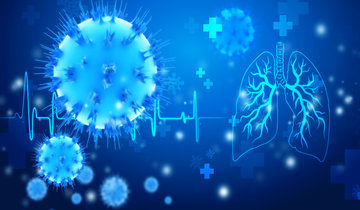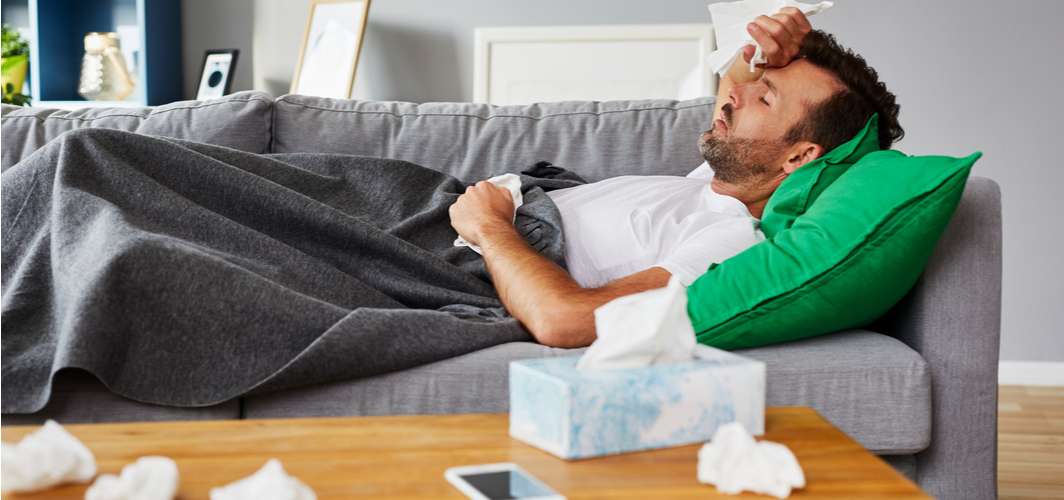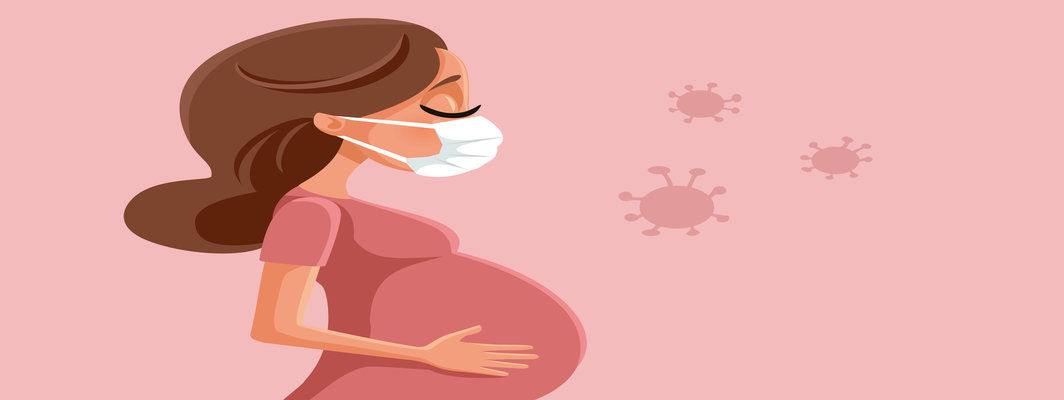Coronavirus Updates
How Can People with Respiratory Illness Protect Themselves Against COVID-19?
6 min read
By Apollo 24/7, Published on - 10 June 2020, Updated on - 18 October 2022
Share this article
2
8 likes

COVID-19 is caused by the novel Coronavirus that is spreading across the world and is known to affect people, often causing mild to severe respiratory infections. While certain at-risk populations are more susceptible to developing complications resulting from COVID-19, experts say that people with chronic respiratory diseases might experience severe illness if they are diagnosed with this novel strain of coronavirus.
What are chronic respiratory conditions?
Respiratory diseases are some of the most prevalent chronic conditions in the world. Common chronic respiratory diseases include asthma, chronic obstructive pulmonary disease (COPD – including emphysema and chronic bronchitis), tuberculosis, and others.
COPD refers to a group of lung diseases that cause blockage in airflow and leads to difficulty in breathing. Smoking is one of the top causes of the development and progression of COPD. The other factors include exposure to air pollutants, genetic factors, and respiratory infections. Managing and preventing such respiratory illnesses is usually done by avoiding triggers (like air pollutants), quitting smoking, and getting vaccinated.
Asthma is a chronic inflammation of the lung airways. It is usually triggered by air pollution, respiratory infections, and allergens such as dust mites, animal dander, pests, pollen, and mold. Asthma management includes avoidance of triggers, medications for symptoms, and vaccinations to prevent infections.
Tuberculosis (TB) is an infection of the lung which shows similar symptoms to COVID-19. The World Health Organization (WHO) states that the occurrence of COVID-19 and TB together may lead to higher risk and poorer outcomes.
Why people with pre-existing lung conditions may be at higher risk
Coronavirus is known to cause respiratory illness, and affected people may experience fever with sore throat, cough, and breathing difficulties. People with asthma or COPD are at the same risk to contract COVID-19 as any other person in their community, but the likelihood of them developing complications from COVID-19 is higher.
Based on the study from the National Institute of Health (NIH), it was confirmed that the risk of severe COVID-19 in COPD patients is four-fold higher than a person without COPD. When we analyzed the available data on asthma with COVID-19, there were mixed results. Few studies which were published by the NIH suggested that asthma patients had severe COVID-19 illness when compared to non-asthma patients. Few other studies found little difference in risk ratio for severe illness in both asthma and non-asthma patients. However, researchers recommended adhering to care plans to keep asthma under control for better COVID-19 outcomes.
What precautions should people with pre-existing respiratory illness take against COVID-19?
People with chronic lung disease must take these extra precautions to control their respiratory conditions along with a few general steps to stay safe.
General precautions:
- Stay at home as much as possible. Use online delivery services for essential goods, medicines and banking
- Maintain a distance of at least 6 feet from others and avoid meeting unwell people
- Wear a face-covering cloth mask while visiting crowded places and when visiting a hospital for any emergency
- Frequently wash hands with soap and water for at least 20 seconds. Alternatively, use an alcohol-based hand sanitizer with at least 60% alcohol
- Do not touch eyes, nose and mouth before washing hands to avoid infection from virus-contaminated surfaces
- Have a routine for sleep, meals and physical activity
- Talk to the doctor regarding the types of exercises that can be done. Set aside at least 30 minutes daily for exercising
- Stay socially connected using phones or video chats with family members. Doing this will boost mental health in stressful conditions like the current COVID-19 pandemic
- Drink water to maintain hydration and eat healthy, well-balanced meals to improve immunity.
Follow COPD action plan:
- Avoid triggers such as air pollutants and second-hand smoke
- Quit smoking
- Follow the care plan suggested by the doctor which may include measuring vitals regularly, supplemental oxygen at night, pulmonary rehabilitation and medications for symptom relief
- Do not change medications without consulting a doctor
- Stay connected to the doctor so they can regularly monitor symptoms, lung function, exercise tolerance and nutrition.
Follow asthma action plan:
- Keep asthma under control by continuing medications
- Do not change the treatment plan without consulting a doctor. Try to use telemedicine services for consultation, if feasible
- Have at least 4 week supply of medications needed such as steroids or inhalers by consulting with your doctor
- Avoid asthma triggers.
Clean and disinfect home:
- Try to have someone who does not have respiratory conditions do the cleaning and disinfecting
- Make sure that a person with such conditions is not in the room
- Minimize use of disinfectants that can trigger the attack
- Open windows and use a fan that blows air outdoors when using cleaning products
- Spray or pour disinfectants onto a cloth and use it for cleaning rather than directly spraying or pouring onto the cleaning surface
- Clean and disinfect all frequently touched surfaces at home.
Reduce mold exposure at home:
- Dry all wet items within 24 to 48 hours to avoid mold growth
- Fix water leaks and replace carpets as soon as possible if mold is present
- If mold is present on any hard surfaces, clean immediately with detergent and water. Allow it to dry completely
- Use an air conditioner or dehumidifier at home to maintain low humidity
- Clean refrigerator and air conditioner drip pans frequently.
Control pests at home:
- Keep sinks, countertops, and the floor clean and free of clutter
- Store food in air-tight containers. Clean dishes and spills on the floor right away
- Seal cracks in plumbing, wall, and cabinets
- Keep trash in a closed bin
- Use pesticide baits and traps in areas away from children and pets. Avoid using sprays and foggers.
Control dust mites at home:
- Use allergen-proof mattress and pillow covers and wash them weekly
- Vacuum carpets and floors regularly. If possible, the person with asthma should stay outside the room while cleaning.
Control animal dander (minute scales from hair, feathers, or skin) at home:
- Avoid having pets at home, if possible
- If a pet cannot be kept away, decrease exposure by
- Keeping pets out of the bedroom
- Washing furry pets frequently
- Using an air cleaner with HEPA (High-Efficiency Particulate Air) filter.
Conclusion
Current data suggests that people with pre-existing respiratory illnesses may have severe complications if they get infected with Coronavirus. Hence, it is recommended to follow hygiene precautions to reduce the risk of exposure. They must strictly follow the care plan recommended by their doctor that may include measuring vitals at home, taking medications and vaccinations.
People with respiratory illnesses should continue to take the vaccines recommended by their doctors as part of their care plan. These vaccinations may not help in preventing COVID-19 but can help people with pre-existing respiratory conditions to avoid severe reactions or illness. It is also important for them to stay connected to their doctor, consult them if they notice any symptoms or changes in their health, or for any medical emergency.
If you need some recommendations for surface disinfectant sprays and sanitizers, here are our top picks:
- Apollo Pharmacy Face Shield
- Apollo Pharmacy Life Multi Surface Disinfectant Spray
- Apollo Pharmacy Anti Pollution Face Mask N95
- Savlon Surface Disinfectant Spray
- Doctors Choice Gloves
REFERENCES:
- https://www.who.int/emergencies/diseases/novel-coronavirus-2019/question-and-answers-hub
- https://www.cdc.gov/coronavirus/2019-ncov/need-extra-precautions/groups-at-higher-risk.html#asthma
- https://www.cdc.gov/features/copd/index.html
- https://www.cdc.gov/asthma/faqs.htm
- https://www.ncbi.nlm.nih.gov/pmc/articles/PMC7262275/
- https://www.ncbi.nlm.nih.gov/pmc/articles/PMC7186942/
- https://pubmed.ncbi.nlm.nih.gov/32371563/
Coronavirus Updates
Leave Comment
Recommended for you

Coronavirus Updates
Do You Have COVID-19, a Common Cold, or Just a Seasonal Allergy?
It is well known by now that COVID-19 has several symptoms that overlap with those of common cold and seasonal allergies.

Coronavirus Updates
How Can Pregnant Women Protect Themselves and Their Babies Against Coronavirus?
The COVID-19 risk among pregnant women is similar to that of any individual. However, in general, pregnant women are vulnerable to all respiratory infections. Hence, it is advisable to follow the necessary social distancing and other precautions.

Coronavirus Updates
New Lancet Study: COVID-19 Spreads Predominantly Through the Air
A Lancet study seems to provide consistent and robust scientific evidence to prove that the SARS-CoV-2 virus is transmitted through the air.
Subscribe
Sign up for our free Health Library Daily Newsletter
Get doctor-approved health tips, news, and more.
Visual Stories

Explained: The Highly Transmissible SARS-CoV-2 Variants
Tap to continue exploring
Recommended for you

Coronavirus Updates
Do You Have COVID-19, a Common Cold, or Just a Seasonal Allergy?
It is well known by now that COVID-19 has several symptoms that overlap with those of common cold and seasonal allergies.

Coronavirus Updates
How Can Pregnant Women Protect Themselves and Their Babies Against Coronavirus?
The COVID-19 risk among pregnant women is similar to that of any individual. However, in general, pregnant women are vulnerable to all respiratory infections. Hence, it is advisable to follow the necessary social distancing and other precautions.

Coronavirus Updates
New Lancet Study: COVID-19 Spreads Predominantly Through the Air
A Lancet study seems to provide consistent and robust scientific evidence to prove that the SARS-CoV-2 virus is transmitted through the air.